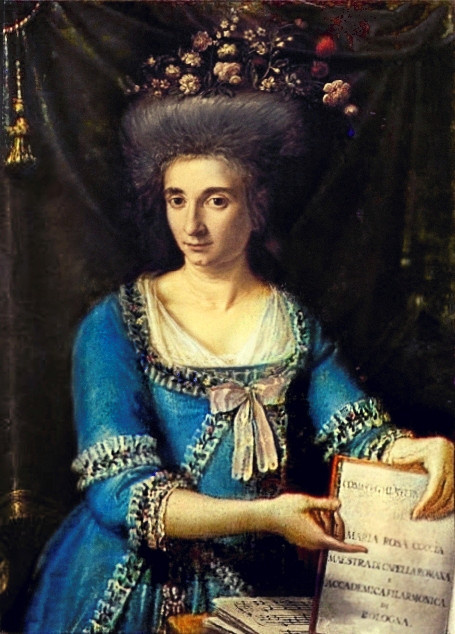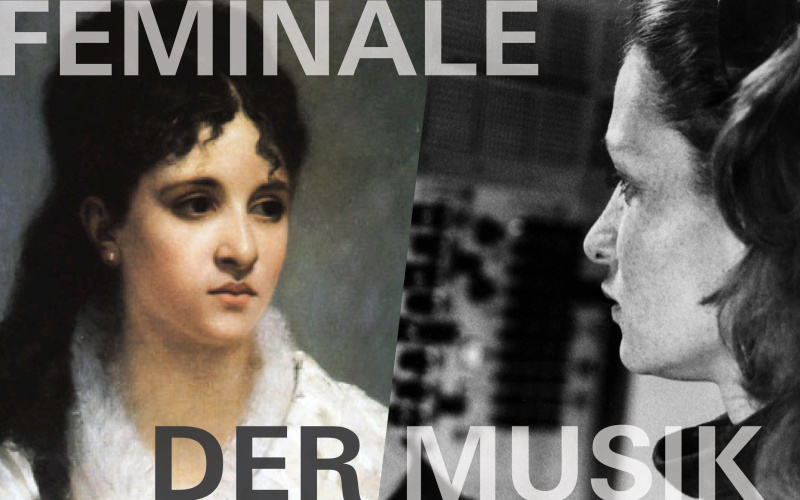Maria Rosa Coccia
Feminale of Music
Maria Rosa Coccia is the first woman to receive the title of »Maestra di Cappella«, which is required for being allowed to work as a musician in Rome.
Maria Rosa Coccia is born on June 4, 1759 in Rome, Italy. Maria Rosa Coccia is often compared to Mozart, who was three years older, and as he was called a wunderkind. Although, unlike Mozart, she did not come from a family of musicians, her father was a pharmacist. Nevertheless, her exceptional musical talent was recognized early on and she received a solid musical education. At the age of twelve she composed six sonatas for harpsichord, at thirteen she composed the oratorio »Daniello nel lago dei leoni« (»Daniel in the Lion's Den«) – almost a sensation in the pure male world of Catholic church music. In the same year he wrote the secular cantata or opera »L'isola disabitata« (»The uninhabited island«), based on a text by the famous librettist Pietro Metastasio. The performances of her works were a great success and were received with enthusiasm by the nobility and the common people alike, as a contemporary source reports.
The Congregazione dei Musici, predecessor of the present Accademia di Santa Cecilia, is the institution in Rome at that time that, with the Pope's approval, watches over the entire musical life of the city. In 1774, at the age of 15, Maria Rosa Coccia was the first woman ever to pass the important examination of the Congregazione and received the title of »Maestra di Cappella«. Coccia's examination paper, which was published soon afterwards, was a fugue to the cantus firmus »Hic vir despiciens mundum«, a text from the Catholic liturgy. Five years later, Coccia is additionally accepted into the Accademia Filarmonica in Bologna and is awarded the additional title of »Maestra pubblica di Cappella«.
Everything points to the fact that Maria Rosa Coccia has a brilliant career as a composer ahead of her. But then the tables turn. After her admission to the Accademia Filarmonica, Coccia is publicly attacked by Francesco Capalti, a Maestro di Cappella of Narni Cathedral, who claims that Coccia's examination paper was flawed. He can make two of the four examiners say that Coccia was awarded the title of »Maestra« not because of talent, but only out of respect for her gender, and that her examination paper should never have been published. They are turning the facts upside down, as it is more likely that Coccia passed the exam, not because of, but despite the fact that she is a woman. A fierce argument lasting several years begins, in which prominent personalities from the Italian music scene emphatically take sides for Coccia, among them the librettist Metastasio mentioned above, the castrato and star singer Farinelli and the composer Giovanni Battista Martini, who is still very well known today.
The last known and datable composition by Maria Rosa Coccia dates from 1783, and her next sign of life is from 1832, almost 50 (!) years later: she asks the Congregazione for a pension, which is granted to her in a modest amount. In her request she mentions that she had »composed and taught all her life«. It is a mystery why – after her promising youth and her meteoric rise – the news about Maria Rosa Coccia broke off so suddenly and completely, and the impression suggests that Capalti's campaign must have been one of the reasons for this. Not long after her pension application, Maria Rosa Coccia dies in November 1833.
Music pieces
How little Maria Rosa Coccia's musical legacy has been dealt with is also shown by the distribution of her works. Unfortunately only this single audio sample is available on YouTube in poor quality. We have intentionally decided to draw attention to this state of urgency by linking to it and hope that the festival will bring the composer out of oblivion.
Accademia Musicale Maria Rosa Coccia, published and performed by Massimo Rocchi together with Olevano Romano at the Castello on January 12, 2014.
Disclaimer
-
Links to external websites of other providers
The ZKM’s express objective is the accuracy and current relevance of any information it makes available on this web site. Mistakes and ambiguities cannot, however, be fully excluded. For this reason, the ZKM is unable to fully guarantee the current relevance, accuracy, completeness or quality of the information it makes available. The ZKM is not subject to coercible legal rules and regulations and to any kind of damages of a material or immaterial nature that may possibly be caused by the use or non-use of the information provided, including free downloads. The ZKM reserves the right to change or delete, to temporarily or permanently suspend access to the web sites at any time.
The responsibility for »external content« to which access is made, in the form of e.g., links, presupposes, among other things, positive knowledge of illegal or punishable content. The ZKM has no influence on this external content and entirely distances itself from such content. Should the displayed external web site include unlawful or offensive content, the ZKM expressly distances itself from such content. When made knowledgeable of such content, the ZKM will deactivate the corresponding link. The same holds for external entries contained in Blogs and discussion forums, links directories, mailing lists and all other forums of databanks operated by the ZKM, the content of which is rendered possible via write access.
All content of the present web site (texts, images, video stills, videos, audios, graphics etc.), the structure as well as the layout of this web site is protected by copyright. These contents, and the information made available by the ZKM (e.g., text and image materials) are available exclusively for individual usage by users of this web site, and not for commercial purposes. These contents may be distributed and copied, made public on the Internet and used for commercial purposes only with the prior consent of the ZKM. Similarly, the placing of deep links, inline links, frame links or similar links in which the ZKM web site is not clearly evident as source, is permitted only with the prior consent of the ZKM. Messages and references to content »share« in social media (e.g. Facebook) do not come under the proviso of this reserve approval. For press releases and photographs valid instructions for usage can be found at: www.zkm.de/en/press/service.
All labels and trademarks named and protected by third parties are subject to the unreserved stipulations of the respective registered owners. That trademarks are not protected by third part rights cannot be assumed merely by mention of the name.
This disclaimer is to be understood as part of the ZKM’s Internet content. In so far as part or single formulations of this text do not, are no longer or are do not entirely correspond to this legal provision, the remaining parts of this document remain unaffected in its content and validity.

